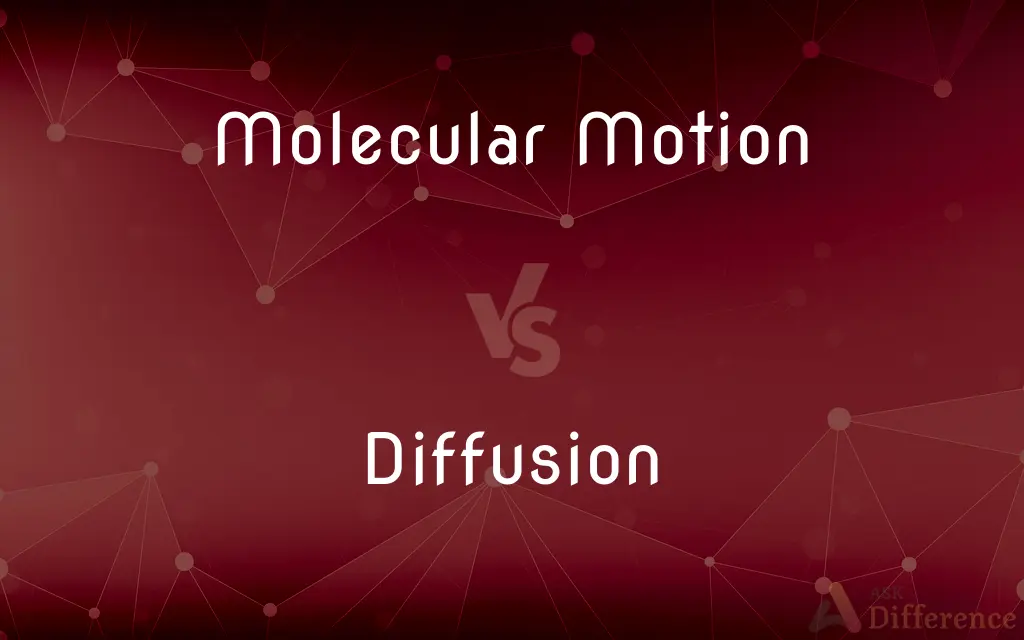Molecular Motion vs. Diffusion — What's the Difference?
By Tayyaba Rehman — Published on December 18, 2023
Molecular Motion refers to the random movement of individual molecules. Diffusion is the net movement of molecules from an area of high concentration to low concentration.

Difference Between Molecular Motion and Diffusion
Table of Contents
ADVERTISEMENT
Key Differences
Molecular Motion is the term that describes the kinetic behavior of molecules, regardless of their state. Whether in solid, liquid, or gaseous form, molecules are always in motion. These motions can be vibrational, rotational, or translational. Diffusion, on the other hand, is a specific type of molecular motion. It relates to the net movement of molecules from a region of higher concentration to one of lower concentration, primarily in liquid or gaseous mediums.
Molecular Motion can be observed in any substance, even if there isn't a noticeable change in the position of the substance. For instance, the atoms in a metal rod vibrate in place even though the rod remains stationary. In contrast, Diffusion is a result of the inherent molecular motion. When a drop of ink is placed in water, the molecules of ink spread out because of diffusion, moving from an area where they are highly concentrated to where they are less concentrated.
Molecular Motion is an inherent property of molecules, driven by their kinetic energy. It does not always result in a change in the macroscopic distribution of a substance. Diffusion, however, always leads to a change in concentration distribution, aiming to achieve equilibrium over time.
Molecular Motion encompasses various types of movements, such as the jiggling motion of particles suspended in a fluid, known as Brownian motion. Diffusion, however, is more directional in nature. Though individual molecules move randomly, there's a net directionality from areas of high concentration to areas of low concentration.
Molecular Motion serves as the underlying principle for many physical phenomena, including diffusion. Diffusion, in essence, is a manifestation of molecular motion, influenced by factors such as temperature, concentration gradients, and the properties of the molecules involved.
ADVERTISEMENT
Comparison Chart
Definition
The random movement of individual molecules.
The net movement of molecules from high to low concentration.
Dependency
Inherent to all molecules regardless of environment.
Depends on concentration gradients.
Result
Doesn't always cause visible macroscopic changes.
Leads to changes in concentration distribution.
Types
Includes vibrational, rotational, translational.
Primarily translational in nature.
Directionality
Non-directional; random.
Directional; from high to low concentration.
Compare with Definitions
Molecular Motion
The kinetic movement exhibited by molecules in all states of matter.
Even in solids, Molecular Motion causes the atoms to vibrate in place.
Diffusion
The intermingling of substances by natural movement of their particles.
The slow diffusion of smoke in the air is visible in a beam of sunlight.
Molecular Motion
The inherent motion of particles due to their thermal energy.
As the temperature rises, the Molecular Motion in a liquid increases, leading to faster evaporation.
Diffusion
The net result of the random motion of molecules in liquids and gases.
The diffusion of sugar in hot water is faster than in cold water.
Molecular Motion
The random, ceaseless movement of molecules in a substance.
The Molecular Motion of gas particles can be visualized using a kinetic molecular theory.
Diffusion
The passive movement of molecules or ions to achieve equilibrium.
Oxygen undergoes diffusion from the lungs into the bloodstream.
Molecular Motion
The continuous jostling and movement of molecules resulting from their energy.
The increase in Molecular Motion when heating a substance is the reason it expands.
Diffusion
The process where particles spread out from areas of high concentration to low concentration.
The diffusion of perfume in a room allows us to smell it even from a distance.
Molecular Motion
The translational, rotational, and vibrational movements of molecules.
In gases, the Molecular Motion is mostly translational, causing them to spread out rapidly.
Diffusion
The spontaneous spreading of a substance within a solvent.
Diffusion is the reason why a raisin in a glass of water becomes plump over time.
Diffusion
The process of diffusing or the condition of being diffused
The diffusion of new technology around the world.
Diffusion
The scattering of incident light by reflection from a rough surface.
Diffusion
The transmission of light through a translucent material.
Diffusion
The spontaneous intermingling of the particles of two or more substances as a result of random thermal motion.
Diffusion
The spread of linguistic or cultural practices or innovations within a community or from one community to another.
Diffusion
The act of diffusing or dispersing something, or the property of being diffused or dispersed; dispersion.
Diffusion
(physics) The scattering of light by reflection from a rough surface, or by passage through a translucent medium.
Diffusion
(physics) The intermingling of the molecules of a fluid due to random thermal agitation.
Gaseous diffusion
Diffusion
The spread of cultural or linguistic practices, or social institutions, in one or more communities.
Diffusion
(marketing) The gradual spread and adoption of goods or services.
Diffusion
Exchange of airborne media between regions in space in an apparently random motion of a small scale.
Diffusion
The movement of water vapor from regions of high concentration (high water vapor pressure) toward regions of lower concentration.
Diffusion
The act of diffusing, or the state of being diffused; a spreading; extension; dissemination; circulation; dispersion.
A diffusion of knowledge which has undermined superstition.
Diffusion
The act of passing by osmosis through animal membranes, as in the distribution of poisons, gases, etc., through the body. Unlike absorption, diffusion may go on after death, that is, after the blood ceases to circulate.
Diffusion
(physics) the process of diffusing; the intermingling of molecules in gases and liquids as a result of random thermal agitation
Diffusion
The spread of social institutions (and myths and skills) from one society to another
Diffusion
The property of being diffused or dispersed
Diffusion
The act of dispersing or diffusing something;
The dispersion of the troops
The diffusion of knowledge
Common Curiosities
Can Diffusion occur without Molecular Motion?
No, Diffusion is inherently a result of Molecular Motion.
How does temperature influence Molecular Motion and Diffusion?
Increasing temperature enhances Molecular Motion, which in turn can speed up the rate of Diffusion.
Is Molecular Motion present in solids?
Yes, Molecular Motion exists in solids, with atoms vibrating in their fixed positions.
What is Molecular Motion?
Molecular Motion refers to the random movement of individual molecules due to their kinetic energy.
What role does concentration play in Diffusion?
Diffusion occurs due to concentration gradients, moving from areas of high concentration to low concentration.
Can we control the rate of Diffusion?
Yes, by influencing factors like temperature, concentration gradients, and medium properties.
Can we observe Molecular Motion directly?
Not typically, but effects like Brownian motion can provide indirect evidence of Molecular Motion.
How does Molecular Motion relate to Diffusion?
Diffusion is a specific type of molecular motion where there's a net movement from high to low concentration.
What's the difference between Molecular Motion in gases vs. liquids?
In gases, Molecular Motion is more pronounced and faster, leading to quicker diffusion compared to liquids.
Why is Diffusion essential for living organisms?
Diffusion facilitates the transport of nutrients, gases, and wastes across cell membranes.
Why is Diffusion slower in thick gels than in water?
The density and viscosity of a medium can hinder Molecular Motion, thereby slowing down Diffusion.
How does Molecular Motion in solids differ from that in gases?
In solids, the primary Molecular Motion is vibrational, while in gases, it's translational.
Are Molecular Motion and Diffusion affected by external forces?
Yes, factors like pressure and electromagnetic fields can influence Molecular Motion and Diffusion.
Does every Molecular Motion result in Diffusion?
No, Molecular Motion is inherent in all substances, but only specific conditions lead to Diffusion.
Share Your Discovery

Previous Comparison
USB Type-A vs. USB Type-B
Next Comparison
Product Layout vs. Process LayoutAuthor Spotlight
Written by
Tayyaba RehmanTayyaba Rehman is a distinguished writer, currently serving as a primary contributor to askdifference.com. As a researcher in semantics and etymology, Tayyaba's passion for the complexity of languages and their distinctions has found a perfect home on the platform. Tayyaba delves into the intricacies of language, distinguishing between commonly confused words and phrases, thereby providing clarity for readers worldwide.











































